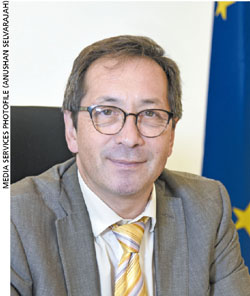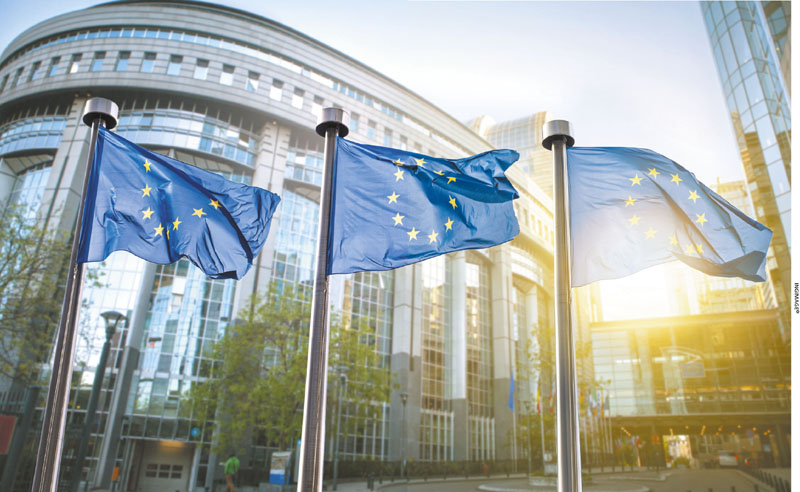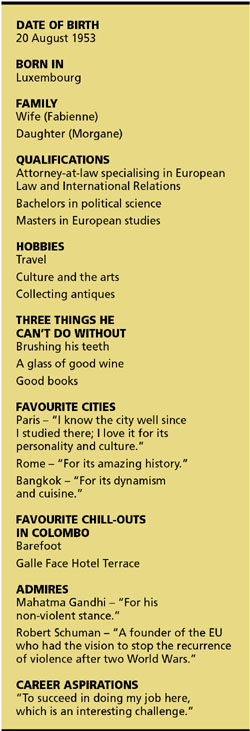DIPLOMATIC MISSION
Compiled by Savithri Rodrigo
LESSONS FROM BREXIT
Tung-Lai Margue says that Brexit is an opportunity to address the unexpected

In June last year, Britain voted in favour of leaving the 28-member European Union (EU) and became the first country in the bloc to do so. The repercussions were extensive with financial markets plunging, and economists predicting substantial damage not only to Britain and the EU but also global trade and commerce.
However, as reality sank in, negotiations prompted by friendly nations began to take shape, paving the path for sense and sensibility. Ambassador and Head of Delegation of the Delegation of the European Union to Sri Lanka and the Maldives Tung-Lai Margue believes that “it’s too early to predict anything.”
“I don’t want to dwell on the future but the EU has lost an important member of its bloc,” he adds, and points out that Brexit doesn’t mean the end of the EU: “This is not the first time the EU has been confronted with a crisis and each time we have come out stronger. There are others waiting for membership and we want to make ourselves attractive to them.”
Margue took up his posting in Sri Lanka in September 2016. He says that becoming part of the EU is a voluntary step made by countries that have agreed to abandon part of their sovereignty for the common good of the people.
“Brexit is an opportunity to address the unexpected – issues we didn’t envisage. How do we better ensure the integration of migrants who have entered the EU and allow them the same opportunities? How do we regulate migration in the future? We need a global strategy on security and defence to reassure people that the EU can provide the security and stability they expect,” Margue avers.

He doesn’t believe that migration and brain drain are alarming problems if handled astutely: “Skilled young people leave a country due to the lack of opportunities. While this is a growing trend and could lead to problems in the future, it also means that the country must look to stimulate employment, which is linked to reform on many fronts including free trade, attracting investors by tackling corruption, transparency and accountability, all creating new and interesting job opportunities.”
Otherwise, he argues, young people won’t have opportunities and they will migrate: “And due to migration, the economy will not have human resources to prompt growth, which means the vicious cycle will simply continue.”
Margue is not a first-timer to Sri Lanka, a country he has always wanted to be posted in. He states that while he’s enamoured with the diversity and friendly people of Sri Lanka, “a palpable difference from three years ago is the freedom of expression and dynamism of the cultural scene. I see many trendy places, an investment boost in real estate and an expression of modernity in the skyscrapers coming up. But I urge you to protect your heritage buildings because they are what make Sri Lanka different to other buzzing economies.” Margue also perceives an increase in pollution.

Firmly believing that the EU can do much for the country, he states: “It’s rewarding for me to be in Sri Lanka at this time. There’s a strong need for international support, and we have the tools to provide efficiency and support to this government and its reform orientation.”
While the pressing issues for Sri Lanka are linked to the reconciliation process and amendments to the constitution that will create the framework for future relationships between the government and provinces, Margue notes that what’s expected is more autonomy without putting the country at risk.
The ambassador also finds the weight of the military quite striking, which is another issue he feels needs to be addressed urgently – because with the war’s end, demilitarisation would be a priority.
Explaining that his role differs from other heads of mission, Margue notes: “My mission is diversified as we represent the entire bloc’s interests in trade competencies, and political and diplomatic areas, while representing the values of the EU. Coordinating with member countries can be somewhat cumbersome as some are represented in New Delhi and not only in Colombo.”
“But our main objective right now is to support reconciliation – a fundamental that has been endorsed by the Foreign Affairs Council of the EU – while also stimulating trade between the EU and Sri Lanka. When economies are strong, it is easier to manage difficult transitions,” he declares.
While apparel remains buoyant as a trade option, stimulated even further if GSP+ becomes a reality, he says SMEs must be made more aware of opportunities in the EU so as to take advantage of what they offer in the greater scheme of economic development.
In conclusion, he views the world with trepidation: “Climate change is a major issue and sustainable development is what needs attention. In the next decade, the Asia-Pacific will likely grow politically. It needs to understand that it is in its best interests to cohesively build a political region that will lead to economic strength. SAARC would be a good place to start,” he asserts, adding that the EU encourages the development of regional powers.



